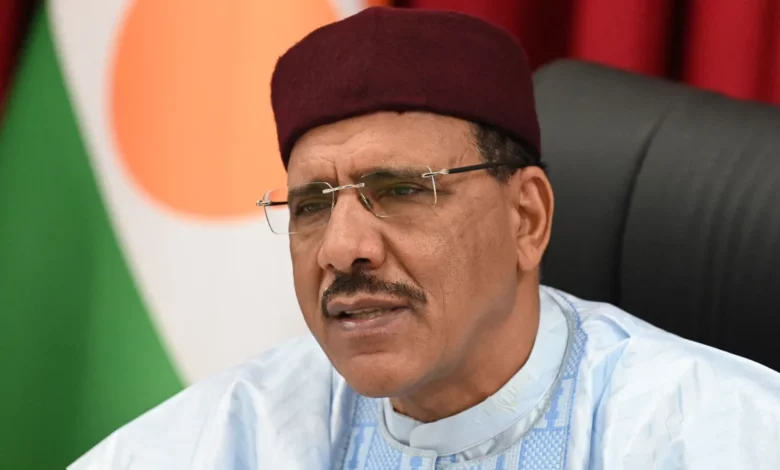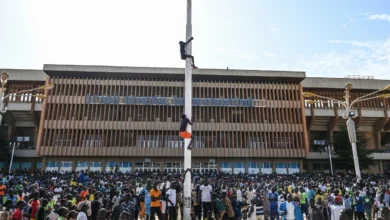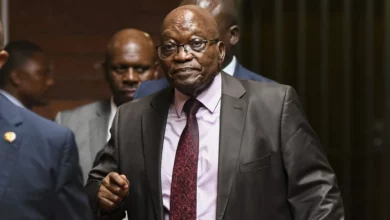
Regional bloc the Economic Community of West African States (ECOWAS) has given the Nigerien military a Sunday deadline to release and reinstate the country’s ousted president, Mohamed Bazoum.
One of the group’s officials said a plan for an intervention had been “worked out,” but that it remained a last resort.
But with the clock ticking, the possibility of military action is becoming a real possibility.
How did we get here?
Niger lies at the heart of Africa’s Sahel region, which has seen numerous power grabs in recent years including in Mali and Burkina Faso.
But Niger has also been one of the few remaining democracies in the region.
President Bazoum’s election win in 2021 marked a relatively peaceful transfer of power, capping years of military coups following Niger’s independence from France in 1960.
But there were signs that Niger’s military leadership believed they had a lack of government support to fight militants and that a coup could change that campaign.
The coup was launched in late July when Bazoum was seized by members of the presidential guard, before national institutions were shut down and protesters from both sides took to the streets.
The head of the guard, Abdourahamane Tiani, has been named as the new leader. The whereabouts of Bazoum are unclear, in an op-ed for The Washington Post he described himself as a “hostage.”
Is intervention likely?
ECOWAS has shown a willingness to take action in cases where leaders refuse to relinquish power or when political crises escalate. The new chairman is Nigeria’s new President Bola Tinubu, who analysts say will be keen to make a mark and show that he is not a pushover.
It will be the first crisis of his short leadership tenure at the ECOWAS and of his country. Tinubu, however, has no military experience.
There is no shortage of tough talking rhetoric though. Local media outlets reported Friday that Tinubu had written to inform lawmakers in Nigeria, as he is legally required to do, of the ECOWAS intention to intervene militarily in Niger if the coup leaders “remain recalcitrant.”
Senegal, a key player in the region, has also pledged troops while Niger’s former colonial power France said it supported ECOWAS’s position.
After a meeting of ECOWAS this week, the Commissioner for Political Affairs, Peace and Security Abdel-Fatau Musah called any military option the “last resort” but added that “all elements that would go into any eventual intervention have been worked out here and are being refined.”
Oluseyi Adetayo, an security and intelligence expert, told CNN: “Preparation is already in top gear, there’s no doubt about that and the military are on standby.
“To my own understanding, Nigeria is not going to back down and will do whatever it takes to return Niger to civilian rule,” he added.
“They want power returned to Bazoum but likely that may not be a feasible outcome. They may have to compromise by getting the junta to leave power but they will not hand over to Bazoum. They will lose out and Bazoum [will] too, and someone neutral could come in to run a transitional government,” Adetayo said.
Has ECOWAS intervened before?
The last notable instance was in 2017, when ECOWAS deployed military forces in Gambia to remove President Jammeh who did not want to give up power after elections.
A show of force at the border compelled Jammeh to step down, leading to a swift resolution. This event has raised the question of whether similar tactics would be successful in the current situation in Niger.
The bloc has also deployed peacekeeping forces, mainly from Nigeria to war zones such as Sierra Leone and Liberia.
But this is the first time it has threatened to intervene in a coup – there was no such response after coups in neighboring Mali or Burkina Faso.
So why Niger?
Niger has huge regional significance. It is the largest country in West Africa and a vital gateway between the Sahel and the rest of the continent.
The Sahel region is beset with security challenges such as terrorism, and insurgency and the country is a critical battleground in the fight against terrorism and a focus for regional and international security efforts.
The US and France consider Niger a critical ally and both countries have military bases in Niger.
The country possesses significant natural resources, with uranium being its most notable asset. Niger is a leading producer of uranium, which is crucial for nuclear energy and other industrial applications.
How are people in Niger reacting?
Many Nigeriens are torn – the country has seen multiple coups and dictatorships, but at the same time poor governance has tarnished the idea that democracy is the solution.
Niger is one of the poorest countries in the world and people are suffering. Basic necessities like food and shelter are priorities.
Some have welcomed the coup. Protests saw Nigeriens denounce France and praise Russia, whose Wagner group plays a role propping up some other West African leaders.
“There are pro-coup protests all over the country, not just in Niamey.” Ali Sounama, a Nigerien journalist told CNN.
“There has been bad governance in Niger for the past 10 years and a lack of justice and a general feeling of insecurity. There are also poor schools and health institutions. All this has led to people welcoming a change of regime,” he added.
That kind of sentiment suggests that even if the stated goal is to restore democracy, a military intervention may not be welcomed across the country.




